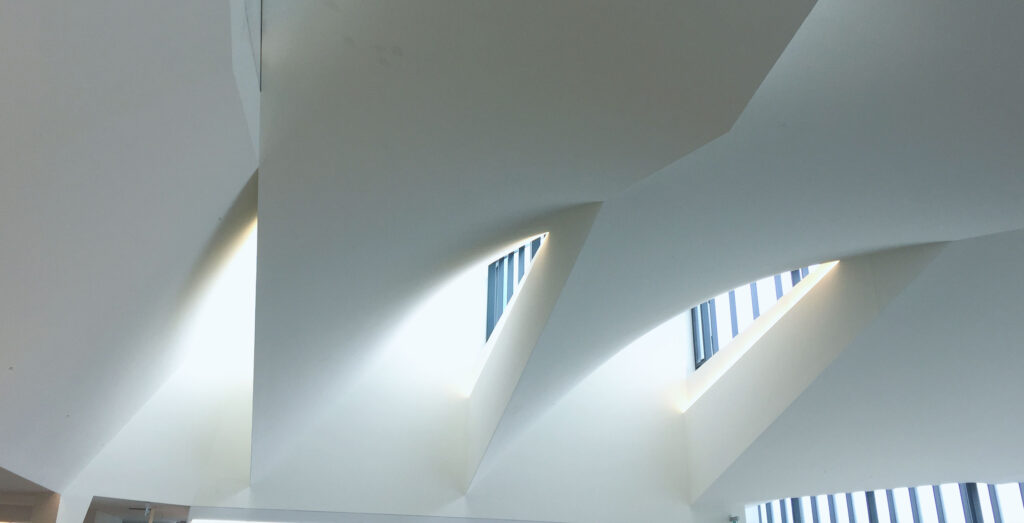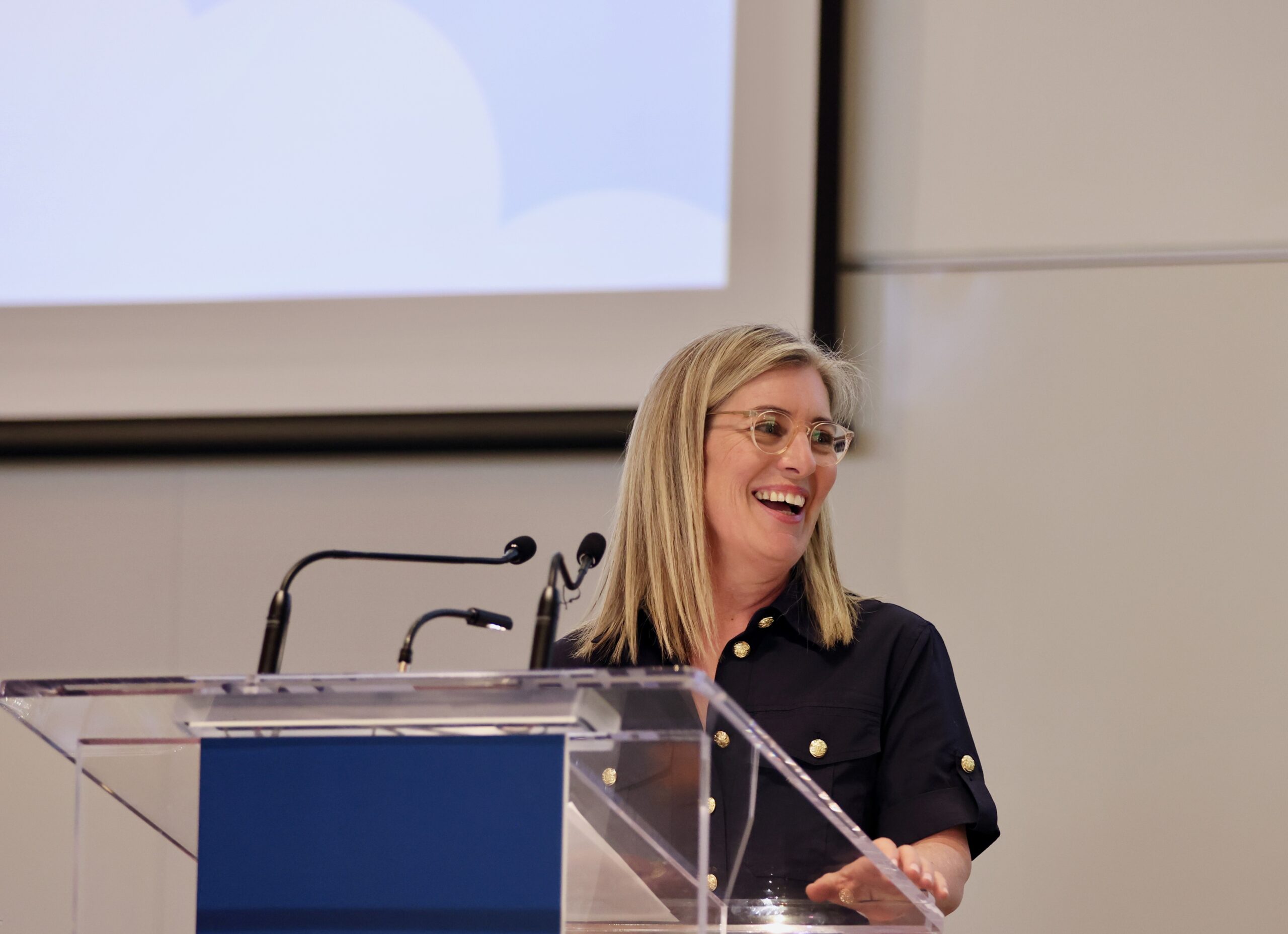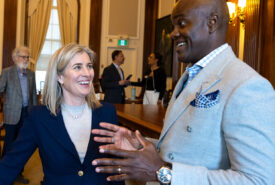Remarks by President Meric Gertler at the Conference on Historical and Contemporary Antisemitism, hosted by the Anne Tanenbaum Centre for Jewish Studies, University of Toronto.
CHECK AGAINST DELIVERY
Good afternoon, everyone. I am very pleased to join you. Though this conference is well underway, I want to welcome you to U of T and to Toronto.
As a university with a global reach and outlook, the University of Toronto is deeply committed to leadership and collaboration in addressing the most important challenges of our time. For that reason, you are all especially welcome at this conference on antisemitism. Thank you for sharing your expertise and insights on this crucial, urgent matter of global concern.
U of T is extremely proud of our tremendous multidisciplinary strengths in all fields related to Judaism, the Jewish people and Israel across our three campuses. That includes our flagship Anne Tanenbaum Centre for Jewish Studies, led by Professor Anna Shternshis, and the newly launched Lab for the Global Study of Antisemitism, led by Professor Ron Levi. On behalf of the entire U of T community, I want to thank both Anna and Ron for their outstanding leadership.
It is now almost one year since the tragic and traumatic events that began with the attack by Hamas against Israel on October 7, 2023. Those events and their aftermath have since reverberated around the world, including here in Canada. Sadly, one of the undeniable consequences has been a dramatic and deeply troubling upsurge in antisemitic acts and speech – a development that has shown itself across society, and quite dramatically at institutions of higher education, including the University of Toronto.
Indeed, this has been a deeply painful time, for Jewish members of the U of T community, and for our Jewish alumni and friends in Toronto and beyond. While there has been increasing concern about antisemitism on our three campuses for some time, it was greatly intensified by the presence of the encampment at the heart of our St. George campus, from early May until early July. And it remains evident in this new academic term, as tensions over the war in Gaza continue to manifest themselves.
The University was successful in bringing a peaceful end to the encampment, when the Ontario Superior Court granted our request for an injunction ordering that it be dismantled. The court affirmed our conviction that, while freedom of speech and protest are fundamental rights, no group has the right to suppress the speech of those with differing points of view, or to appropriate any part of our campus to the exclusion of others.
Justice Markus Koehnen also concluded that the University had not succeeded in meeting the legal standard of proof required to establish that individual encampment leaders or occupants had engaged in antisemitic language or actions. At the same time, as the court indicated, it is clear that many members of the community experienced deeply offensive incidents of antisemitism in the vicinity of the encampment.
Let me acknowledge, here and now, that those incidents have caused undeniable harm to members of the Jewish community at U of T and to the University as a whole. I and the rest of the leadership of the University are fully committed to addressing this challenge, to help avoid further injury and to move our community forward.
In keeping with the theme of Professor Jeffrey Kopstein’s keynote address, I want to take a few minutes to tell you about our ongoing response to the challenge of antisemitism. Ultimately our goal is to focus on creating the optimal conditions to advance our core mission of research and teaching. Foundational policies such as our 1992 Statement on Freedom of Speech remind all members of the University of our shared responsibility to ensure that everyone is able to work and study in an environment free of discrimination or harassment.
An essential part of our effort will be to clarify what constitutes antisemitism so that we may recognize and respond to it more effectively. And here, let me thank Anna and Ron for their compilation of the recent lived experience of Jewish faculty and staff – an exercise that documents a wide range of troubling practices on our campuses. We have recently convened an informal group of academic colleagues to advise us on how best to tackle these matters. Their first task will be to consider how we might develop an operational definition of antisemitism that is consistent with the mission of an academic institution.
As a public institution, we have an obligation to uphold the Ontario Human Rights Code, which prohibits discrimination based on national origin. This means that nobody – not departments, not faculty members, not student groups – is entitled to exclude Israelis or attach conditions to their participation in any aspect of university life. The Human Rights Code also prohibits religious discrimination. Discrimination based on creed or place of origin does not cease to be prohibited simply because the word “Jewish” or “Israeli” is replaced with the word “Zionist.”
Moreover, Article 5 of the Memorandum of Agreement between the University and the Faculty Association holds that academic freedom does not “preclude commitment on the part of the individual. Rather academic freedom makes such commitment possible.” Support for Israel can be considered such a commitment, and as such cannot be prohibited by academic units or individual instructors.
This definitional work will be an important element of our plan to strengthen our capacity to respond to complaints of hate and discrimination. The goal is to make our system clearer, faster, more effective and more accountable.
We are also embarking on a review and update of our Statement on Discrimination and Discriminatory Harassment, which was approved as a policy of the University in 1994. Our goal is to sharpen the effectiveness of the policy, and to promote awareness of its contents and significance throughout the University, as well as the shared responsibilities it entails. This exercise is being undertaken in response to a number of advisory committees we have established in recent years to combat racism in all its forms, including the Antisemitism Working Group chaired by University Professor Arthur Ripstein.
Embracing a core recommendation from the final report of the Working Group, our Institutional Equity Office has redefined its mandate and scope explicitly to include antisemitism. It is also augmenting its capacity to counter antisemitism. And it is developing new training modules for managers across the University, to strengthen their ability to respond appropriately to antisemitic language and actions.
I would like to mention briefly a few other initiatives.
In April, after consultations over the past two years, we announced revised considerations for deciding whether the University or its individual academic units should issue institutional statements in response to matters of emerging concern. Endorsing a position of greater institutional neutrality, the University will no longer make statements on matters of scholarly debate or contentious political issues.
By extension, academic units must abide by the same principle if they are to maintain a culture of inclusion and mutual respect, in which no member of our community feels unwelcome or excluded because of their political beliefs, religion or nationality. Simply put, the University’s role is not to take sides in such debates, but to create the conditions in which a diversity of viewpoints can be expressed, to support constructive debate, and to foster deeper understanding of complex issues.
To that end, we have initiated a community-wide process to enhance the capacity of our students, faculty and staff to ‘disagree well’ – to be able to discuss and debate difficult, politically charged issues across positions of difference. In doing so, we aim to restore a culture of civil discourse on our campuses. As a leading academic institution whose mission is the advancement of knowledge and the education of responsible citizens, nothing is more fundamental.
Led by Randy Boyagoda, professor of English, distinguished academic administrator and former president of PEN Canada, the Civil Discourse Working Group will issue its recommendations by the end of this academic year. Professor Boyagoda is also working with our Centre for Teaching Support & Innovation to develop resources for faculty members, instructors, and TAs to help them address difficult issues, disruptions, challenging conversations, and antisemitic or other racist or discriminatory remarks in the classroom.
Of course, protests remain an integral part of academic life. But in order to maintain a civil, respectful and inclusive environment, protestors must adhere to the rules. So, at the start of this fall term, we issued a User Guide to U of T Policies on Protest and Use of Campus Spaces. It provides a concise, clear outline of existing University policies, supplemented by the direction from Justice Koehnen outlining the conditions for lawful protest. We have disseminated the Guide widely across our entire community.
Finally, I would like to highlight something that will not change: a firm and consistent position of the University of Toronto, which it has held for decades, well before the recent protests. We remain unequivocally opposed to academic boycotts – targeting scholars or institutions simply because of the country in which they are located. As I and my predecessors have said many times – and as recently reaffirmed by the Board of the Association of American Universities (to which U of T has belonged since 1926) – this is completely antithetical to our commitment to academic freedom, to the unfettered global circulation of people and ideas, and to the advancement of understanding by fostering collaboration and dialogue.
Accordingly, we will continue to support academic collaboration with scholars and universities in Israel. To underscore our commitment, and to ensure our community understands the underlying rationale, we will be highlighting the full suite of University policies and statements that support this position.
The University will also remain staunchly committed to respectful, evidence-based debate among people with diverse perspectives, as a crucial prerequisite of learning, discovery and progress – including the right to criticize the actions and policies of the government of Israel.
Let me conclude my remarks by acknowledging two truths.
First, the battle to combat antisemitism – the oldest form of racism known to humankind – will not be easy.
We will need to articulate and implement policies that require disciplinary action by the University when it is clearly appropriate. In other instances, where the action or speech in question is hurtful or offensive but not unequivocally antisemitic, corrective intervention may still be called for, to help community members appreciate how their behaviour has negatively impacted others around them. Here we must rely on academic leaders, including deans, principals, department chairs, and directors, to create and reinforce a culture of inclusion. We are committed to working with them to disseminate best practices in this regard.
In many other instances, however, we will need to rely on the recognition by everyone in our community that they have a shared responsibility to create an environment for teaching, learning and research that is free from harassment, discrimination and hate. This means comporting ourselves in ways that are informed by empathy, understanding and respect for our fellow students, faculty and staff.
Second and finally, the most important way we can address this monumental challenge is through our core mission of scholarship and teaching, which enhances deeper understanding of difficult questions, accommodates debate over contentious issues, and promotes the search for solutions. That is precisely why the work of the Anne Tanenbaum Centre for Jewish Studies, the new Lab for the Global Study of Antisemitism, and the scholars assembled here today is so important.
Thank you for your kind attention.


